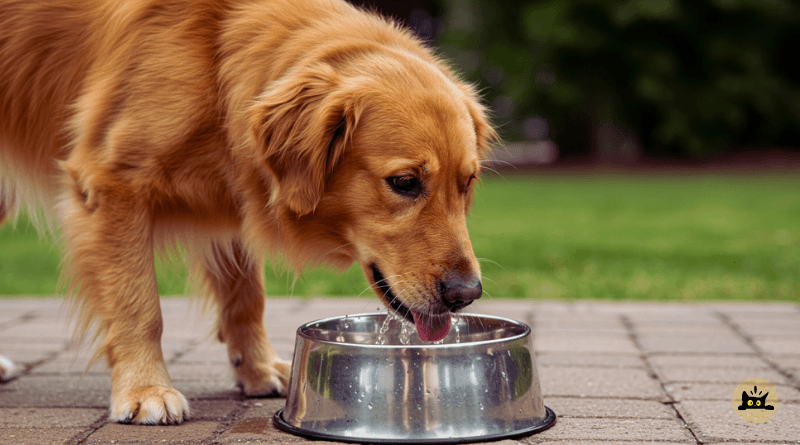Dogs dry out faster than most people realize, and dehydration can turn from “no big deal” to a vet emergency in one hot afternoon. These dog hydration tips will keep that water bowl working as hard as your pup does. Water powers every cell, cushions joints, keeps body temperature steady, and flushes toxins. From a lazy couch day to a long hike, the ideas below help your best friend feel and perform his best.
Why Dogs Lose Water So Quickly
Dogs have only a few sweat glands, so they cool off mainly by panting. Every puff of warm air pulls water from their body. Add dry kibble, indoor heaters or AC, hard play sessions, or certain meds, and their daily water need shoots up. VCA Animal Hospitals says a healthy dog should drink about 50–60 milliliters per kilo of body weight each day so a 20-kilo (44-pound) dog needs roughly a full liter, and even more when it’s hot or humid.
Everyday Signs You’re Already Seeing
• Sticky pale gums • Shoulder skin that “tents” and doesn’t snap back • Sunken dull eyes • Sudden tiredness or refusal to play • Dark or scant urine
The AVMA warns that even mild signals need quick action; left alone, dehydration can turn into kidney damage or heatstroke in hours.
Sneaky Water Wasters in Real Life
- Only dry kibble – Dry food is just 10 % water. Replace about one-third with canned food or stir in warm salt-free broth.
- Always-on heating or AC – These units pull moisture from indoor air. A small humidifier near your dog’s bed cuts the invisible water lost while breathing.
- Hard play on muggy days – Humid air makes cooling tough. Schedule fetch at dawn or dusk.
- Travel stress – Some dogs refuse water on trips. Get them used to the same fold-up bowl at home first.
- Medicines that boost pee output – Ask your vet if a prescription changes water needs.
Simple Dog Hydration Tips That Really Work
Make It Move
Many dogs love running water. A pet fountain keeps it fresh and appealing—no more day-old bowl taste.
One Bowl per Zone
Place one water station on every floor, in quiet spots your dog normally visits. Senior pups shouldn’t limp through furniture mazes to reach a drink.
Quick Taste Boosts
Add a teaspoon of salt-free broth, plain goat milk, or a few crushed frozen blueberries. PetMD notes flavoring can make dogs drink twice as much when healing after surgery—proof it works at home too.
Ice Treats for Hot Days
Drop plain ice cubes or cucumber ice cubes into the dish after exercise. The cold surprise makes most dogs lap longer while gently cooling their body.
Measure, Don’t Guess
Fill a one-liter jug each morning and use it to top bowls. By night you’ll know exactly how much your dog drank versus what just evaporated.
What to Do if Dehydration Sneaks Up
| How Bad It Is | What to Do Now | When to Call the Vet |
|---|---|---|
| Sticky gums, light panting | Offer cool water, add broth, move to shade | If your dog still ignores water after 30 minutes |
| Skin tenting, dry nose, tired | Give water with a big kitchen syringe every 10 minutes | If vomiting starts or signs last an hour |
| Collapse, rapid heartbeat, sunken eyes | Wrap in a cool wet towel and get to the emergency vet | Go now—no matter what |
Dogs Who Need Extra Water
• Puppies – Faster metabolism dries them out; keep a shallow dish in the playpen. • Short-nosed breeds (Bulldogs, Pugs) – Narrow noses make them pant more; use ice-cold towels after walks and skip midday outings. • Working and sport dogs – Sled-dog studies at UC Davis show they can burn 12 000 calories daily and need up to five times normal water. Offer sips every 20 minutes on the trail. • Older dogs and kidney patients – Ask your vet about canned diets or giving fluids under the skin at home if bowls alone don’t cut it.
Bringing It All Together
Keeping a dog well-watered is a daily job, not just a summer reminder. By measuring intake, adding flavor, setting bowls where your dog actually hangs out, and spotting early signs, you can head off trouble before it starts. The payoff? Cushioned joints, healthier kidneys, shinier fur, and many more playful years. Water isn’t just a drink; it’s the cheapest health plan your dog will ever have.
Sources : Blue Cross for Pets, American Veterinary Medical Association, VCA Animal Hospitals
Check out another helpful article in this category: Breed-Specific Dog Food Nutrition for a Healthier Pet

